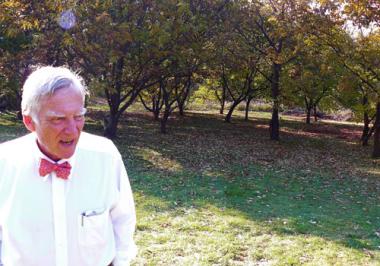At the Amherst Farmers' Market you can sample fair trade coffee and register to vote. To the casual buyer, farming can seem idyllic while shopping here, with growers offering tastes, tips, and wisdom on living in the moment in their mud boots, with their beautiful children.
On October 25, two weeks before the last day of the market, and with Thanksgiving coming up, Sunset Farm's roasted chestnuts were doing a brisk business and sold out before the end of the morning. Sunset has 25 hybrid chestnut trees which were planted in the 1980s. It was tough going in the beginning; 200 trees were lost to the phytophthora blight in the first two years.
Sunset is a 10-acre farm only a few blocks from Amherst Center. As on many area farms, most of the growing is done without the use of pesticides, herbicides, fungicides, or chemical fertilizers. "The flea beetle, striped cucumber beetle and the potato beetle are annual problems," says owner Bill Gillen. And of course, woodchucks, rabbits and deer take their cut.
Bill and Connie Gillen have been vendors since the market started several decades ago. Like many, they left an urban environment and came to the Valley for the soil. While attending PS 102 in Brooklyn, Bill Gillen got into growing at the school's Victory Garden. It was during World War II and the whole country was in on the effort. Now he and Connie, his wife of 50 years, grow produce, flowers and fruit and have 25 chestnut trees.
Why Amherst? As a kid, Gillen did his homework. "I looked at the seed packet and read 'sandy loam, full sun.' I said to my mother, 'Where can I find this?' She said, 'Not here.'" After grad school in Cambridge, his architectural firm sent him to Western Mass., where he and Connie settled in 1969.
Idyllic as his life might seem, Bill the Farmer is as much at the mercy of the marketplace as Joe the Plumber. "For the Farmers' Market alone there is a kind of demand that must be met to even be in the market," says Gillen. "It's like an entertainment show. The Farmers' Market must have something every week: garlic week, eggplant week, and so on." Connie says there are restrictions on growers selling at the Amherst Farmers' Market. "Amherst Farmer's Market is a Class A market," she says. "You have to grow what you sell in this market."
As others will attest, staying in the farming game requires endurance and flexibility in an environment subject to the vagaries of weather and the economy. At Enterprise Farm in Whately, owner Dave Jackson and his employees are embarking on a year-round CSA where they are growing food, selling other local food and trucking in food from the South. "How can small growers take advantage of their customer base in the wintertime?" says Jackson. "What I'm trying to do is to promote a business model that allows small farmers to operate year round like any other business."
The season is over for the farmers' markets. Options for those who wish to continue buying locally grown and prepared foods are a few stores, co-ops and CSAs (Community Supported Agriculture farms). Whole Foods, Atkins, Serio's, Elmer's Store in Ashfield and other stores offer locally grown foods in season, storage crops (locally grown potatoes, onions and other root vegetables), dairy, bread and locally prepared foods such as Real Pickles. Co-ops like River Valley and Green Fields Market sell local food at a discount for members. In winter, the only CSAs offering shareholders seasonal food are Enterprise Farm and Brookfield Farm in Amherst.
Gillen, whose farm is a linchpin of the Amherst Farmers' Market, says that while there is safety in crop diversification, it is not cheap. "This year I paid $18k in labor," he says. Gillen works with a team of three during the summer season. "Chestnuts come in and there is a two-week window," he explains. "You have to pick them, husk them, refrigerate them and sell them. Same with the tomatoes. When they come in, you have to pick and market them. Otherwise you've lost it." He harvests on Fridays in time for the market on Saturdays.
Although he would like to do the work himself and save the labor costs, it is virtually impossible for one man. "Planting takes a team," he says. "Within a few weeks seeds and plugs must be set out for all the crops—it takes a lot of help to get it done when the weather permits… Many crops like lettuce, chard, sorrel, arugula, radishes wilt within an hour of picking." If that sounds like a lot of work, consider this: for Gillen, the farm is a side job. He works as an architect with partner Kathy Ford during business hours.



